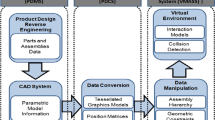Abstract
As technological advancements have led to the onset of industry 4.0, there must be a shift in the organizational frameworks, wherein manufacturing propensities and the traditional workplaces must transform to adopt a system wherein humans and machines can work together towards a rise in productivity and flexibility. These recent developments call for an up-gradation of the traditional operator to Operator 4.0 or Smart Operator as there has been a rise in a typical, unique work relationships which will require interactions between the operators and machines. These are challenging circumstances for engineers and operators as they must enhance their skills and abilities to keep up with the changing trend. Smart operators will also need to update their cognitive skills parallel with the innovations in the field of virtual reality and wearable technology equipment, as the equipment’s augment the abilities of the Operator 4.0. This article aims to (1) Highlight the cognitive ergonomics skills required by operator 4.0 for Virtual Reality VR applications (2) Demonstrate how VR can be used to train future operator 4.0 to do his future tasks (3) Suggest how VR application in manufacturing can be improved for operator 4.0. The methodology in this research involves the usage of Virtual Reality to simulate a factory setup emulating Industry 4.0 factory. Based on the feedback of the participants, the efficiency of VR in training workers in the manufacturing industry can be determined. Also, this exercise can aid designers in avoiding Graphical User Interface issues and further develop the system to maximize efficiency and to provide a positive user experience.
Access this chapter
Tax calculation will be finalised at checkout
Purchases are for personal use only
Similar content being viewed by others
References
Aniruddha Talekar SP, Thakre P, Rajkumar E (2017) Virtual reality and its applications in manufacturing industries. J Chem Pharmaceut Sci (JCHPS), 10(1):151
Arrighi P-A, Mougenot C (2019) Towards user empowerment in product design: a mixed reality tool for interactive virtual prototyping. J Intell Manuf 30(2):743–754
Cailhol S, Fillatreau P, Fourquet J-Y, Zhao Y (2015) A hierarchic approach for path planning in virtual reality. Int J Interact Des Manuf (IJIDeM) 9(4):291–302
Grewe P, Kohsik A, Flentge D, Dyck E, Botsch M, Winter Y, Markowitsch HJ, Bien CG Piefke M (2013) Learning real-life cognitive abilities in a novel 360°-virtual reality supermarket: a neuropsychological study of healthy participants and patients with epilepsy. J NeuroEng Rehab 10(1):42. https://doi.org/10.1186/1743-0003-10-42
Kaasinen E, Schmalfuß F, Özturk C, Aromaa, S, Boubekeur M, Heilal, J, Heikkilä P, Kuula T, Liinasuo M, Mach S, Mehta R,Walter T (2020) Empowering and engaging industrial workers with Operator 4.0 solutions. Comput Ind Eng 139.https://doi.org/10.1016/j.cie.2019.01.052
Kim IJ (2016) Cognitive ergonomics and its role for industry safety enhancements. J Ergonom 6(4). https://doi.org/10.4172/2165-7556.1000e158
Kinzel H (2017) Industry 4.0–Where does this leave the Human Factor? J Urban Cult Res 15:70–83
Longo F, Nicoletti L, Padovano A (2017) Smart operators in industry 4.0: a human-centered approach to enhance operators’ capabilities and competencies within the new smart factory context. Comput Ind Eng 113:144–159. https://doi.org/10.1016/j.cie.2017.09.016
Martens MA, Antley A, Freeman D, Slater M, Harrison PJ, Tunbridge EM (2019) It feels real: physiological responses to a stressful virtual reality environment and its impact on working memory. J Psychopharmacol 33(10):1264–1273
Mattsson S, Gullander P, Harlin U, Bäckstrand G, Fasth Å, Davidsson A (2012) Testing complexity index–a method for measuring perceived production complexity. Procedia CIRP 3:394–399
O'Neill G, Ball M, Liu Y, Noghabaei M, Han K (2020) Toward automated virtual assembly for prefabricated construction: construction sequencing through simulated BIM. arXiv preprint arXiv:2003.06695
Ordaz N, Romero D, Gorecky D, Siller HR (2015) Serious games and virtual simulator for automotive manufacturing education and training. Procedia Comput Sci 75:267–274
Rabelo RJ, Romero D, Zambiasi SP (2018) Softbots supporting the operator 4.0 at smart factory environments 536:456–464. https://doi.org/10.1007/978-3-319-99707-0_57
Stadnicka D, Litwin P, Antonelli D (2019) Human factor in intelligent manufacturing systems - knowledge acquisition and motivation. Procedia CIRP 79:718–723. https://doi.org/10.1016/j.procir.2019.02.023
Ruppert T, Jaskó S, Holczinger T, Abonyi J (2018) Enabling technologies for operator 4.0: A survey. Appl. Sci 8(9):1650
Author information
Authors and Affiliations
Editor information
Editors and Affiliations
Rights and permissions
Copyright information
© 2022 The Author(s), under exclusive license to Springer Nature Switzerland AG
About this paper
Cite this paper
Fallaha, M., Korhan, O., Zeeshan, Q. (2022). Virtual Reality: A Possibility for Training Operator 4.0. In: Calisir, F. (eds) Industrial Engineering in the Internet-of-Things World. GJCIE 2020. Lecture Notes in Management and Industrial Engineering. Springer, Cham. https://doi.org/10.1007/978-3-030-76724-2_25
Download citation
DOI: https://doi.org/10.1007/978-3-030-76724-2_25
Published:
Publisher Name: Springer, Cham
Print ISBN: 978-3-030-76723-5
Online ISBN: 978-3-030-76724-2
eBook Packages: EngineeringEngineering (R0)




